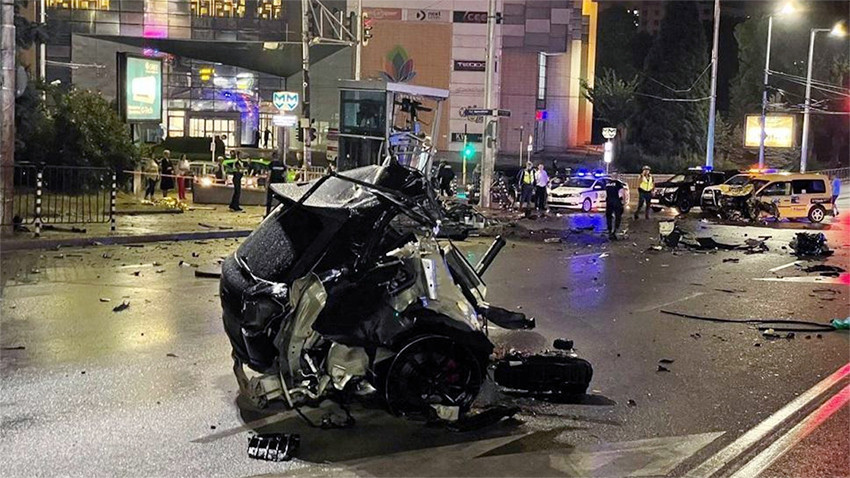Road police in Bulgaria have been registering more and more traffic offences. And the results go far deeper than mere statistics – since the beginning of October alone 9 people have been killed on Bulgaria’s roads, and a total of 392 since the beginning of the year. Adding to these figures the number of people who have been injured /6,287 since the beginning of 2022/, and who will never forget what happened, it is clear that the extent of the savagery on the roads of the country is atrocious. Out of control vehicles with drivers who obviously believe they are above the law, have been taking human lives, and the cause – alcohol and drugs. Several extremely serious traffic accidents that took place in the summer led to intensified police checks. More than 11,000 cars are stopped every day, as a result 30 drunk or drugged drivers a day have been caught in September, Interior Ministry data show. This means that the number of drivers under the influence of drink and drugs who have been stopped by traffic police on the road in the period from the beginning of the year until 25 September stands at 6,411, or 760 more than in 2021.
There is a war going on Bulgaria’s roads, with people dying in numbers equal to the casualties in a local conflict, said Prosecutor General Ivan Geshev during a discussion on how to improve road safety held in September. “The fact that Bulgaria tops the list of European countries in the number of traffic accidents is to a great extent due to the lack of interaction among the different institutions. The problems are rooted in the fact that no one cares,” he said.
Against the backdrop of all this, there have been calls for legislative changes to bring down the number of road accidents caused by drivers under the influence of alcohol and drugs. One such change is to disallow court settlements with people who have been charged with other, similar offences. But is that enough to discipline drivers?

“To my mind, a much bigger problem than the severity of the sentence is that things never come to a conviction at all,” says lawyer Velislav Velichkov.
“Very often people caught driving under the influence of alcohol or drugs get away with it and only get administrative acts and penalty orders. In other cases, inspections and criminal proceedings are instituted, but they get nowhere. There is no sound evidence to back the indictment so there can be a conviction.”
Out-of-court settlements are a common practice in these cases. They have to be applied with the consent of the casualty, or their relatives, Velislav Velichkov says. However, the current practice is very different:
“Settlements are reached without consulting the casualties or their relatives, and without taking into account the material damages if they are covered by the insurers, and these settlements bring the sentences down below the minimum stipulated by the relevant text of the criminal code, and that is when prison sentences become suspended sentences or even administrative offences, so the culprit just pays a fine. That is a practice that definitely has to be put an end to.”
For there to be adequate measures, an analysis has to be made of the causes and the circumstances that allow multiple traffic offenders to continue to drive their cars.
“What we are seeing in these latest severe traffic accidents,” Velislav Velichkov says, “is that we have multiple road traffic offenders, young people with, to put it mildly, controversial behavior and a criminal record, with 18-20, in the latest instance 29 penalty orders to his name, yet their drivers’ licenses have not been revoked. We have to find out why these people do not get caught, why they are not being prosecuted, especially with an accumulation of penalty orders for the same offence, and whether the roadside checks for drugs are genuine.”

The investigation of one such serious crime, when two young women were killed at a road junction in Sofia, established that almost 40 police officers, including three high ranking officers, had been covering up for the driver. “These people helped him get administrative penalties for serious offences,” said caretaker Interior Minister Ivan Demerdzhiev, citing the preliminary report of the investigation.
The investigations continue into a failure to act by officials in the case of the car crash at the end of September, in which one person was killed on the Sofia ring road and two are in hospital in serious condition. The record of the driver who caused the crash shows he has 35 tickets to his name, yet he has been left to drive his car.

“I must admit that we have lost our sense of living in a community, we have grown so vicious,” comments Ivan Nikolov, chairman of the International Association of Persons Insured and Road Accident Casualties. “That is having an effect on how drivers behave.”
Interviews by Radio Plovdiv, Radio Varna and Horizont channel, BNR
Compiled and edited by Yoan Kolev
Photos: BGNES, bntnews.bg, stolica.bgFrom today, residents of Stara Zagora, young and old, can send their letter to Santa Claus. A letterbox has been set up in the foyer of the city's State Puppet Theatre to collect messages for Father Christmas. The cultural institution guarantees that..
A Christmas tree with Bulgarian decorations has been placed in a central location at the Griffin Museum of Science and Industry in Chicago. For the fifth consecutive year, Bulgarians living in Chicago crafted the lavish decoration of the Bulgarian..
The usurpation of cultural heritage is one of the many inevitable consequences of any military conflict, both historically and today. Until the end of the war in Ukraine, it is impossible to adequately analyse the extent of the damage caused to the..
The Varna Regional Library "Pencho Slaveykov" has acquired a humanoid robot. It was unveiled by the library's director, Radka Kalcheva, during the..

+359 2 9336 661
